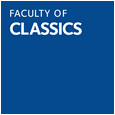Classics and Modern Languages

Latin inscriptions and Roman letters. (Image credit: Shutterstock).
Classics and Modern Languages (CML) enables you to combine study of either one or both of Latin and Ancient Greek with a modern language. The course involves extensive study of major literary texts, alongside training in linguistic skills. The Greeks and Romans were active in all the countries covered by the available languages. Not only does studying this course help to give you greater access to the ancient cultures, it is also a chance to examine how classical literature and culture have shaped and been received by their modern counterparts. Both options include a year abroad which helps bring the course to life even more.
Two routes through the course, called ‘options’, are available to Classics and Modern Languages students. You can choose between the two options whether or not you have taken Ancient Greek and/or Latin to A-level or equivalent: both options have versions with Beginners’ Latin or Greek.
The two routes are identical in their last two years, and lead to the same final exams; they differ only in their first one or two years. Please consider the two options carefully before you make your decision.
Further information about the different options available in Classics and Modern Languages.
Option A
Option A divides its time evenly between Classics (mostly language and literature) and Modern Languages.
This option lasts three years for students who have studied Latin and/or Greek to A-level or equivalent, and four years for those who are taking the version with Beginners’ Latin or Greek. Option A is also known as the ‘Prelims route’, because you will take a Preliminary Examination similar to that taken by Classics and English or Modern Languages students.
With the year abroad, this option is total of four or five years.
Summary of key features of Option A route
- ‘Prelims Route’
- Preliminary Examination at the end of first year
- four or five years in total (depending on whether or not you are starting your classical language as a beginner).
Option B
Option B begins with a focus on Classics. For the first five terms, students take all the same options available to students of Classics:
- Greek and/or Latin language,
- literature,
- ancient history,
- archaeology,
- philology
- and ancient or modern philosophy
This option lasts four years, whether or not you have any prior experience in Latin or Greek. Option B is also known as the ‘Mods route’, because you will take Honour Moderations (first exams) in Classics, which are identical to those taken by Classics students.
With the year abroad Option B is a total of five years.
Summary of key features of Option B route
- ‘Mods Route’
- Honour Moderations Examinations in the second term of second year
- more focus on Classics in the first five terms
- five years in total.
UCAS Course codes: see Information for applicants to the BA in Classics and Modern Languages on choosing your course options for a full list
Course length: 4 or 5 years
Course requirements: Latin and/or Greek to A-Level (or equivalent) is required only for the three-year version of Option A. Classical Civilisation or Ancient History can also be helpful, but are not required.
Modern language: see Information for applicants to the BA in Classics and Modern Languages on choosing your course options for a full list of the modern language options available. Beginners’ courses in modern languages are not available to candidates who have not studied either Latin or Ancient Greek to A-level or equivalent, and will be taking a beginners’ course in a classical language.
University Prospectus: http://www.ox.ac.uk/admissions/undergraduate/courses-listing/classics-and-modern-languages
Final Examination: Honour School of Classics and Modern Languages
Admissions criteria for Classics and Joint Schools
https://www.youtube.com/embed/auOAk0eQpKI



